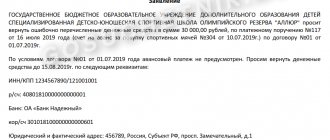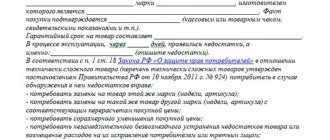Procedure for returning a car to the seller
To do this, you, of course, need to terminate the contract for the purchase and sale of a car (hereinafter referred to as the product). The grounds for termination may be significant violations of quality requirements, violation of the terms of the contract regarding the transfer of documents for the car, etc.
This can be done both extrajudicially and in court, on the grounds provided for by the contract or legislative acts. The procedure itself includes the following points:
Send a written, reasoned claim to the seller to terminate the contract. As a general rule, contractual relations terminate from the moment the claim is received (clause 1 of Article 450.1 of the Civil Code of the Russian Federation). Such a claim must necessarily contain: arguments for which you decided to refuse the contract, references to the law or relevant clauses of the contract, details of the contract; in the petition part it is important to indicate your intention and ask to return everything transferred under the contract, the period of such transfer.
Since the above claim is a legally significant document, it must be sent in such a way that the direction can be proven - by registered mail with a list of attachments, by telegram, delivered in person, using a courier service.
Recipient's address is the address specified in the contract or an extract from the Unified State Register of Legal Entities/Unified State Register of Individual Entrepreneurs, which can be obtained on the official website of the tax service.
If the seller refuses to answer you, or is inactive, that is, does not respond at all, the dispute will have to be resolved through court.
How to return a car to its former owner
The procedure for returning a used car is as follows. If a serious malfunction occurs, you need to seek an examination from an independent technician. He must establish the cause of the breakdown and its duration. The time of failure of the part determines the ability to challenge the buyer’s intentional damage to the car and the court’s approval to terminate the transaction.
If it turns out that the defect appeared before the purchase and sale agreement was signed, the buyer should send a written claim to the seller by mail with the result of the examination. The claim must state all the facts and demand a refund. Also in the letter you can refer to the fact that the buyer has the right to refuse a product that does not correspond to the description.
If the seller ignores the letter and refuses to return the money, you should file a claim with the court at the seller’s place of residence and collect the money in court.
If the car turns out to be collateral, you will have to prove that at the time of purchase it was not listed in the register of collateral. If this is really the case, you will need to take an extract from the notary and proceed according to the same scheme: file a claim with the seller, and, if it remains unanswered, go to court. But if the car was listed in the registry at the time of the transaction, it will not be possible to return the car back.
Also read: I purchased a car at a location other than my place of registration: is it possible to register it there?
Returning a car purchased on credit
Like almost any product, a car purchased on credit can be returned to the seller if deficiencies are identified during its operation, but not within fourteen days, but fifteen (clause 1 of Article 18 of the Law on the Protection of Consumer Rights). However, the shortcomings identified during this period may be insignificant.
In addition to the return, you have the right to exchange the car, with an additional payment on your part if it is more expensive, and on the part of the seller if its value is lower.
If the above period has passed, then you can return the car if significant deficiencies are identified, for example:
- The car was under repair for a month or more over the course of a year (certainly not as a result of an accident). In this case, this period is summed up.
- Repeated occurrence of the same fault.
- The vehicle's passport parameters do not correspond to those stated - for example, fuel consumption significantly exceeds that stated in the documents.
- Troubleshooting will take significant time or money.
- And so on.
In the cases stated above, the car can be returned to the seller under warranty.
Return procedure:
A claim outlining your position and the corresponding requirement. The seller has 10 days from the date of receipt for her satisfaction.
If the claim is refused, ignored or the deadline is violated, go to court with a corresponding application.
Important : during the consideration of the claim, the seller has the right to conduct an examination, which must be paid for by him, you have the right to be present at it, and the seller himself is obliged to notify you of the place and time of its conduct in advance!
Claim to return the car to the seller
If the shortcomings are not specified in the agreement between the buyer and the seller, then from the moment of receiving the car, the client has the right to return the car on all legal grounds. You can receive cash or a car of a similar model, but without defects. Another option is to exchange goods of inadequate quality, i.e. exchange of a car for another with possible recalculation. But the defect may be very small, and then the application to return the car may not be satisfied.
If more time has passed, then you can return the car to the dealership only if certain conditions are met:
- violation of deadlines for eliminating defects
- repeated elimination of deficiencies
- detection of a significant malfunction that cannot be repaired even in a service workshop
If you have taken your car in for repair several times already, you can return the car to the seller legally and resolve the dispute with the car dealership. Repeatedly occurring faults that can only be repaired for a disproportionate amount are already a reason to contact the salon and issue a return. There should be no obstacles to performing such actions.
USEFUL : watch a video with advice from a lawyer on filing a claim
When can you return a car to its former owner?
You can return the car in the following cases:
- The car is listed as collateral. This situation often occurs in secondary markets due to the fact that buyers are fooled by the seller’s supposed honesty and do not check the car’s history. If the car was sold by a private person, after the transaction his trace goes cold, and the debts pass to the new owner. If the latter does not even know about the collateral, he risks losing the car when the bank collects the debts. To keep the car and relieve someone else's debt, you need to prove that at the time of the transaction you did not know about the pledge. In July 2014, Article No. 352 of the Civil Code of the Russian Federation was published, which allows the return of the pledged item if there is evidence.
- The car has hidden and irreparable defects. These include a welded body, faulty airbags, and problems with fuel and brake lines. The product can be easily returned if the faults were not reflected in the vehicle condition report at the time of handing over the keys.
- The vehicle does not meet the stated specifications. The seller must provide the buyer with all the necessary information about the technical condition of the car and appearance before signing the contract. Indicating knowingly false and incorrect information about the condition of the most important components: engine, transmission, brake system is illegal.
You can return the car either to a private person or to a car dealership. But you need to understand that you will bear all the costs, and the process itself may take months. The minimum period within which a decision is made in such cases is six months. Plus you will have to enlist the support of a lawyer. If you win, you will not only be able to return the car, but also compensate for repair costs and legal fees. Experienced lawyers even recovered the car in the condition that was specified in the policy.
Also read: Is it possible to return a car to a car dealership: how and when to do it
Claim for car return
As we mentioned earlier, first of all you need to send a pre-trial claim to the seller. As a rule, the buyer is an individual, so if you are dissatisfied, you should contact the district court, and today the claim can be filed at the buyer’s location.
NOTE : no state fee is paid when filing an application for consumer protection.
The statement of claim must indicate:
- Details of the seller, buyer;
- Data about the agreement – date, time, place of its conclusion;
- The essence of the dispute, the nature of the violation (identified malfunctions), relevant evidence;
- The pleading part is to terminate the contract and eliminate violations of rights by returning money or exchanging (this is at your discretion or in accordance with the purchase and sale agreement);
In addition, you have the right to ask for a penalty and a fine in accordance with the law on the protection of consumer rights, as well as reimbursement of legal costs (if any).
Sample statement of claim for termination of a car purchase and sale agreement
In the Verkh-Isetsky District Court of Ekaterinburg, Ekaterinburg, st. Malysheva, 2 B
Plaintiff:
P.
Respondent:
Limited Liability Company
Statement of claim
on the collection of funds under a car purchase and sale agreement
Between me and the LLC, a purchase and sale agreement No. 82/14 was concluded for a FORD Ford FOCUS car worth 480,000 rubles. Cash in the amount of 480,000 rubles as payment for the car was transferred to the seller at the time of conclusion of the specified agreement.
After purchasing the car, during the diagnostics, significant defects were identified:
- The automatic transmission housing is broken (needs replacement),
- steering rack replacement, broken housing, oil leak,
- replacement of all SDC anthers,
- replacing front brake discs,
- replacing the engine block,
- replacement of attachment belts,
- the headlights are screwed on with self-tapping screws,
- replacement of spark plugs with cleaning of fuel injectors, throttle valve,
- malfunction of the electrical cooling fan control circuit,
- malfunction of the output amplifier stage or the fan electrical circuit,
- malfunction of the alternator load input circuit,
- break or short circuit of the electrical monitoring circuit,
- IMRC output signal is incorrect.
When concluding the purchase and sale agreement, the seller did not inform me about the listed defects of the vehicle. With these deficiencies, it is impossible to safely drive the specified vehicle. Due to the identified deficiencies of the car, the repair of which is technically complex and time-consuming, I sent a claim to the defendant asking for a refund.
In accordance with Part 1 of Article 1005 of the Civil Code of the Russian Federation, under an agency agreement, one party (agent) undertakes, for a fee, to perform legal and other actions on behalf of the other party (principal) on its own behalf, but at the expense of the principal, or on behalf and at the expense of the principal. Under a transaction made by an agent with a third party on his own behalf and at the expense of the principal, the agent acquires rights and becomes obligated, even if the principal was named in the transaction or entered into direct relations with the third party for the execution of the transaction. Having analyzed the agency agreement, we can come to the conclusion that, in fact, a relationship has developed between the parties under a commission agreement.
By virtue of clause 1, 3 tbsp. 990 of the Civil Code of the Russian Federation, under a commission agreement, one party (the commission agent) undertakes, on behalf of the other party (the principal), for a fee, to carry out one or more transactions on its own behalf, but at the expense of the principal. Under a transaction made by a commission agent with a third party, the commission agent acquires rights and becomes obligated, even if the principal was named in the transaction or entered into direct relations with the third party for the execution of the transaction. The law and other legal acts may provide for the specifics of certain types of commission agreements.
The buyer has the right to refuse to fulfill the sales contract and demand a refund of the amount paid for the goods. In this case, the buyer, at the request of the commission agent and at the expense of the commission agent, must return the goods with defects.
USEFUL: watch the video and find out why it is better to draw up any sample claim or complaint with our lawyer, write a question in the comments of the video, subscribe to the YouTube channel
In accordance with Article 450 of the Civil Code of the Russian Federation, amendment and termination of the contract are possible by agreement of the parties. At the request of one of the parties, the contract can be changed or terminated by a court decision only: 1) in the event of a significant violation of the contract by the other party; 2) in other cases provided for by this Code, other laws or agreement. A violation of the contract by one of the parties is considered significant, which entails such damage for the other party that it is significantly deprived of what it had the right to count on when concluding the contract.
In the event of a unilateral refusal to fulfill the contract in whole or in part, when such refusal is permitted by law or by agreement of the parties, the contract is considered respectively terminated or modified.
Also, Article 18 of Law N 2300-1 “On the Protection of Consumer Rights” establishes that after the expiration of the 15-day period, the requirements specified in the article must be satisfied in one of the following cases:
- detection of a significant defect in the product;
- violation of the deadlines established by this Law for eliminating product defects;
- the impossibility of using the product during each year of the warranty period in total for more than thirty days due to repeated elimination of its various deficiencies.
I also believe that I suffered moral harm. I estimate moral damage at 100,000 rubles.
I believe that in my favor a fine must also be collected from the defendant due to his failure to voluntarily comply with the consumer’s requirements.
Since the defects of the car are significant and arose before the car was handed over to me, therefore, I consider it possible to refuse to fulfill the sales contract and demand a refund of the amount paid for the goods.
Based on the aforesaid and guided by Article. Art. 450, 431, 990, 1005 of the Civil Code of the Russian Federation, Article 18 of the Law of the Russian Federation of February 7, 1992 N 2300-1 “On the Protection of Consumer Rights”, paragraph 29 of the Rules for Commission Trade in Non-Food Products
ASK:
- terminate the purchase and sale agreement dated June 27, 2014, concluded between me and LLC No. 82/14 of the FORD Ford FOCUS car worth 480,000 rubles;
- to recover from the Defendants in my favor the amount paid for the car in the amount of 480,000 rubles jointly and severally.
- to recover from the Defendants in my favor compensation for moral damage in the amount of 100,000 rubles jointly and severally.
- to recover proportionately from the Defendants in my favor legal costs in the amount of 4,000 rubles.
- recover from the Defendants in my favor a fine in the amount of 50% of the amount of the stated claims.
Date, signature
Attention: watch a video on the topic - how to protect your consumer rights, and also subscribe to our YouTube channel so as not to miss useful information and the opportunity to consult a lawyer for free:
How to terminate a contract with a car dealership and return money for a low-quality car?
When purchasing a car, the buyer expects to use it for its intended purpose. But it often turns out that it is impossible to use the vehicle due to defects made during its assembly, which were not known at the time the purchase and sale agreement was concluded. And this, in turn, gives rise to a large number of disputes between buyers and sellers. How can a car buyer protect his interests?
In this article we will analyze situations with returning a new car to a dealer: under what conditions can you return the car, how to process a return. First of all, it should be noted that an individual purchasing a car from a car dealer or other legal entity seller is additionally protected by the provisions of the Consumer Protection Law, which will be discussed below. Relations between individuals, as well as between legal entities and individual entrepreneurs are not regulated by this law, therefore, if defects are discovered in the car in these cases, the buyer must be guided by the provisions of the Civil Code of the Russian Federation and the terms of the concluded sales contract (more about the general provisions for returning goods to the seller in cases where the protection of rights law does not apply, read here).
Let's start with the fact that, in accordance with the Decree of the Government of the Russian Federation of November 10, 2011 No. 924, a car is a technically complex product for the return of which special rules are established.
Step-by-step instructions: “Cancellation by a consumer of a car purchase and sale agreement with a dealer and a refund for the car”
If you find defects in a car purchased from a dealer or other legal entity, follow the following algorithm to get your money back.
Step 1. Check the conditions and deadline for submitting a claim for vehicle defects
If any defects are found in the car
the buyer may apply for a refund or replacement of the car with another car of the same brand (model, article) or with a similar car of another brand (model, article) with a corresponding recalculation of the purchase price within 15 days from the date of receipt of the car.
After this period, the buyer has the right to make these demands only in one of the following cases:
- a significant defect was discovered in the car (in this capacity, one should consider a fatal defect or a defect that cannot be eliminated without disproportionate costs or time, or is detected repeatedly, or appears again after its elimination, or other similar defects; the significance of the defect is established by an automotive technical examination)
- The period for repairing a car due to the discovery of a defect lasts more than 45 days, unless a shorter repair period is established by the contract
- it is impossible to use the car for more than 30 days during each warranty year due to repeated elimination of its various deficiencies
According to the Supreme Court, the right to refuse to execute a sales contract in relation to a technically complex product, within the meaning of the above norm, is granted if it is impossible to use a technically complex product due to repeated elimination of its various defects for more than thirty days of each year of the warranty period, that is in any year of that period. To exercise such a right, it is sufficient only to be unable to use it for more than 30 days during at least one year in such a period (Determination of the Armed Forces of the Russian Federation dated June 21, 2016 No. 16-КГ16-19).
Thus, to return the car on the third basis, three conditions must be simultaneously met:
- inability to use the car for more than 30 days a year (in any year of the warranty period)
- inability to use is caused by repeated appearance of deficiencies
- impossibility of use is caused by the occurrence of various deficiencies
When terminating a car purchase and sale agreement with a dealer on this basis, it is necessary to take into account other nuances that have been the subject of consideration in the courts. In particular, during the warranty period various defects must be eliminated, and their presence must lead to the impossibility of using the car, since not all defects prevent its normal operation (appeal ruling of the St. Petersburg City Court dated July 18, 2017 in case No. 33- 11374/2017).
It should also be taken into account that the mere fact that a car is under repair for more than 30 days during the year during the warranty period is not an unconditional basis for returning the purchase price for it. For example, if there is extraneous noise inside the car due to the failure of one or another equipment, such a breakdown requires repair, but it does not prevent the use of the vehicle, unlike, say, such a significant defect as engine failure. This mechanism is one of the key elements of the vehicle, the characteristics of which directly affect its safety. In this regard, the inoperability of such a structural part of the car, which manifests itself repeatedly, gives the consumer the right to refuse the sales contract and demand a return of the purchase price paid for the goods (appeal ruling of the Samara Regional Court dated May 18, 2017 in case No. 33-5891/2017) .
The resulting defect in the car must be production-related, that is, it must arise before the vehicle is transferred to the consumer (appeal ruling of the Astrakhan Regional Court dated July 12, 2017 in case No. 33-2333/2017).
If the defect is of an operational nature and appeared as a result of the consumer’s violation of the rules for using the vehicle, the seller should not be responsible for this (appeal ruling of the Court of the Khanty-Mansiysk Autonomous Okrug - Ugra dated May 31, 2016 in case No. 33-3678/2016).
At the same time, the Supreme Court draws attention to the fact that the period of “impossibility of using” the car includes not only the time of repair, but the period of delivery of the car to the service and the period of travel of the buyer to the service for the car, and if the purchase and sale agreement provides for an international guarantee, then the buyer has the right to contact a foreign service, and in this case the delivery time and travel time may be significant (Decision of the Supreme Court of the Russian Federation dated December 16, 2014 No. 34-KG14-10).
In practice, some consumers may unscrupulously create an artificial situation for the emergence of the right to withdraw from the contract, for example, by avoiding coming to the dealership to receive their car after warranty repairs have been performed. In such cases, the courts take into account all the evidence available in the case confirming the timely performance of warranty work by the defendant. In particular, confirmation of this circumstance may be the content of telegrams and other postal correspondence sent to the plaintiff, audio recordings of telephone conversations and other admissible and reliable evidence (appeal ruling of the Saratov Regional Court dated June 29, 2017 in case No. 33-2643/2017).
There are two situations in which withdrawal from a purchase and sale agreement is not permitted:
a) the buyer’s actions may be qualified as an abuse of right
b) the party entitled to such refusal confirms the validity of the contract; subsequent refusal on the same grounds is not allowed.
As an illustration of the first situation, we can cite a court decision in which the court, despite the presence of defects identified in the car, refused to terminate the purchase and sale agreement for the buyer.
An example of a buyer’s abuse of rights when terminating a contract with a dealer. The plaintiff's car was under warranty repair for more than 30 days only during the first year of the warranty period. After this, the plaintiff used the named car for two years and did not send any demands to terminate the contract to the defendant. And then he went to court. Moreover, there were no significant defects in the plaintiff’s car at the time of going to court. In the situation under consideration, the plaintiff’s behavior allowed us to say that his actions to terminate the purchase and sale agreement were an abuse of law, which was a sufficient basis for refusing the claim (Determination of the Supreme Court of the Russian Federation dated July 18, 2017 No. 16-KG17-21).
To summarize, we can advise the consumer to exercise his rights carefully, choosing, depending on the situation, those methods of protection that are most consistent with his property interests. The presence of grounds for termination of the purchase and sale agreement allows the consumer to claim the funds paid towards the cost of a low-quality car. In this case, there is no point in agreeing to repairs, extending the warranty period and other options offered by the seller or the manufacturer’s representative office, but using the right to withdraw from the contract if there are grounds.
So, in the “exceptional” cases described above, the car buyer has the right to file a claim for a refund after 15 days, but the period for filing a complaint regarding these shortcomings is also limited in time.
The buyer has the right to make this requirement during the warranty period (and if it is not established, then within 2 years). Moreover, if the warranty period is less than 2 years, then return requests can be made by the buyer after the expiration of the warranty period, but within 2 years from the date of transfer of the goods, if the buyer proves that the defects of the goods arose before its transfer to the consumer or for reasons that arose before this moment (an expert’s opinion can serve as such evidence). And even after the expiration of the 2-year warranty period, during the entire service life or if it is not established - within 10 years from the date of receipt of the goods, the consumer has the right to demand elimination of defects in the goods if significant deficiencies are identified that arose before the transfer of the goods to the buyer (but only about eliminating deficiencies in this case, and not about returning).
Step 2. Make a claim for a refund for the car and send it to the car seller
The written claim is drawn up in free form, indicating the full name, address and other contact information of the applicant; seller's data, car name, make, model, serial number, individual characteristics, date and place of purchase, payment method; detected deficiencies, time and circumstances of their discovery; request to the seller to return a car of inadequate quality, indicate in the claim your bank details for transferring funds. It is necessary to file a claim for the return of a car of inadequate quality and a refund of the money paid for a poor-quality car if the deadlines and other conditions for filing this claim, which we discussed above, are met.
We recommend that you attach to your claim copies of documents confirming the purchase and payment for the car, documents confirming the seller’s warranty obligations.
How to submit a claim to the dealer for a refund for a car of inadequate quality?
- submit to an authorized representative of the dealer, in this case the representative puts his signature on the second copy of the claim indicating his full name and position, as well as the date of acceptance of the claim and the seal of the seller (if any). Keep this copy of the claim as confirmation of your appeal to the seller.
- send the claim by registered mail with acknowledgment of delivery and a list of the attachments (indicate the essence of the claim in the list), this option is preferable, as it will allow, in any case, if necessary, to confirm compliance with the claim procedure
Also, at the request of the seller and at his expense, you must return the car of inadequate quality. Please ensure that the return of the vehicle is documented (the seller must give you proof of acceptance upon delivery of the goods). Before sending the car to a car dealer, we recommend that you conduct an independent auto technical examination and call the seller.
Step 3. Take part in the vehicle quality check
The seller is obliged to accept a car of inadequate quality, having previously explained to the buyer the procedure for returning and accepting such goods. If necessary, the seller carries out a quality check (orders an auto technical examination). The buyer has the right to participate in checking its quality; it is better to inform the seller in advance in writing about his desire to participate in the check. To do this, we recommend agreeing with the seller on the time and date of its holding. Checking the quality of goods may include an examination. If you disagree with the results of the examination, you can challenge the experts’ conclusions in court.
Step 4.
Get money for a low-quality car
The deadline for returning money paid for a low-quality car is established by law and is 10 days from the date of submission of the claim. When returning funds to the buyer, the seller does not have the right to deduct from them the amount by which the value of the goods has decreased due to full or partial use, loss of marketability or similar circumstances.
Step 5. If the seller refuses to resolve the issue voluntarily, file a claim in court
The statement of claim is filed in a court of general jurisdiction (district court) at the consumer’s choice: at the location of the consumer, at the location of the seller, at the place of conclusion of the contract or its execution. When choosing jurisdiction, we recommend that you focus on the practice of a particular court, study the decisions made by the court on similar disputes, and look at the percentage of reduction in penalties for late repayment.
The claim must be accompanied by documents confirming the purchase of the car, compliance with the claim procedure, the conclusion of an independent expert, if an examination was carried out, as well as copies of the postal receipt and a list of the contents confirming the sending of the claim and documents to the defendant.
In addition to demands for a refund for a low-quality car, the consumer also has the right to make the following demands:
- for compensation for losses caused to you in connection with the sale of a low-quality car, including the difference between the price of the goods established by the retail purchase and sale agreement and the price of the corresponding goods at the time the court made a decision
- on the collection of a penalty for violating the deadline for the return of funds (the amount of the penalty is established by law, cannot be reduced by agreement with the consumer, the penalty for late return of money for goods is 1% of the price of the car for each day of delay)
- on the collection of penalty interest for the use of funds under Art. 395 Civil Code of the Russian Federation
- for the recovery of compensation for moral damage (the amount is indicated by the consumer in the claim at his own discretion, the court determines it according to its conviction in the court decision
- on the collection of a fine for failure to fulfill the legal requirements of the consumer (50% of the amount of return awarded by the court, penalties and other amounts awarded by the court, except for legal expenses)
- on the collection of compensation for legal expenses (state fees, if paid, legal services, etc.)
State duty when going to court with a claim for a refund for a low-quality car
Plaintiffs in claims for the protection of consumer rights are exempt from paying state fees if the value of the claim does not exceed 1 million rubles. If the price of the claim exceeds 1 million rubles, the state duty is paid in the amount calculated based on the price of the claim and reduced by the amount of the state duty payable if the cost of the claim is 1 million rubles. The consumer must also take into account that when calculating the fee, a fine (50%), compensation for moral damage, and legal costs are not included in the calculation of the cost of the claim. That is, when calculating the cost of the claim, we sum up only the amount of return for a low-quality car, losses, interest and penalties.
Note! Amounts of penalties and fines paid to citizens in connection with violation of consumer rights are subject to personal income tax. Compensation for moral damage and legal expenses are not subject to personal income tax.
Step 6. Take part in court hearings to protect your interests
The representative needs to protect his interests in court in order to prove his right to return funds and collect other amounts (based on the provisions on the return of a low-quality car specified above). As part of a court case, a forensic auto-technical examination may be carried out to determine the causes of defects in the car.
Step 7. Obtain a court decision and writ of execution
The court decision comes into force after 1 month from the date of its issuance, unless it has been appealed to the appellate authority. If the decision has been appealed, then it is necessary to wait for the court hearing in the appellate instance. The decision of the appellate court comes into effect on the day it is issued. After the decision enters into legal force, the consumer receives a writ of execution to collect funds and begins searching for the seller’s money (the consumer has the right to apply to the bank where the seller has an account, or to the bailiff service to enforce the court decision). The deadline for executing a court decision to return money for a low-quality product depends on the availability of funds from the seller, his tricks and tricks, as well as on the agility and efficiency of the consumer himself.
Step 1
Check the conditions and deadline for submitting a claim for vehicle defects
Step 2
Make a claim for a refund for the car and send it to the car seller
Step 3
Take part in the vehicle quality check
Step 4
Get money for a low-quality car
Step 5
If the seller refuses to resolve the issue voluntarily, file a claim in court
Step 6
Take part in court hearings to protect your interests
Step 7
Receive a court decision and writ of execution
Return of a car purchased on credit or in installments
When buying a car, people often resort to the services of banks, obtaining a consumer loan for the purchase of the desired car, or installment payment provided by the dealer. At the same time, the question often arises: “How to return a low-quality car purchased on credit without remaining in bondage to the bank?”
The legislator, understanding the special social significance of relationships between citizens and sellers involving bank funds, provided special rules aimed at protecting consumer rights:
- If a consumer returns a low-quality car for the purchase of which a consumer loan was obtained, the seller returns not only the amount of money paid for the car, but also the interest and other payments paid by the consumer under the consumer loan agreement. But this rule applies if the loan was targeted (for the purchase of a car) or a tripartite agreement was drawn up with the bank, or the seller himself issued the loan. If the connection between receiving a loan and a specific purchase is not clearly visible, the consumer cannot demand that the seller return the interest paid on this loan.
- If the consumer returns a low-quality vehicle purchased by him on an installment plan, which was provided by the seller himself, the seller is obliged to return the amount of money paid for the goods (that part of it that has already been paid to the seller), as well as the fee for providing the installment plan (interest, surcharges, etc.). P.).
At the same time, when returning goods that were purchased with credit funds, you should always remember about the third party in the legal relationship - the bank. There are cases when, after returning the car and receiving funds, the consumer forgets about the agreement with the bank, and is subsequently surprised at the amount of accrued penalties and interest for a seemingly terminated loan.
To avoid such consequences, it is recommended that after returning the car, you contact the bank with a request to terminate the loan agreement, attaching to your application the documents prepared by the seller upon return.
Don’t have time to deal with the termination of the purchase and sale agreement with the dealer yourself? Contact an auto lawyer for consumer rights protection, we will quickly draw up all the necessary documents, terminate the contract with the dealer and recover money for the low-quality car. In most cases, payment for our services is made only after collection of money from the seller (receipt of money to the buyer’s account). You can familiarize yourself with the terms of service provided by an auto lawyer for returning the car to the dealer and collecting money for the car here.









